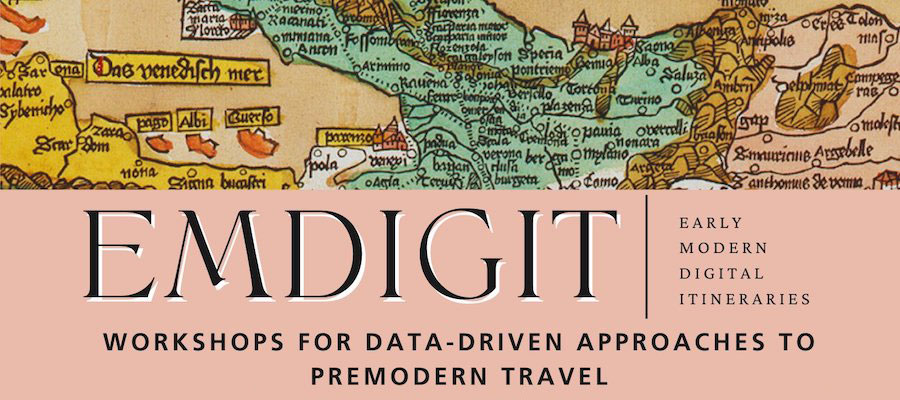Early Modern Digital Itineraries Workshops for Data-Driven Approaches to Premodern Travel, Zoom and Washington, D.C., January–August, 2024
The Early Modern Digital Itineraries (EmDigIt) Project advances new collaborative and data-driven approaches to premodern travel. With the support of a Digital Humanities Advancement grant from the Office of Digital Humanities of the National Endowment for the Humanities, we will be hosting three (3) virtual workshops on Zoom over the course of Spring 2024 as well as an in-person conference in the Washington D.C. area, August 5th, 2024.
We seek interested participants at work on premodern travel studies and with an interest in data-driven approaches. Researchers of any institutional affiliation or career stage (including current PhD students) are encouraged to apply. Prior digital humanities experience or involvement with spatial historical projects a plus, but not required. Participants will receive a stipend towards lodging and travel for the August 2024 in-person one-day conference hosted at the Roy Rosenzweig Center for History and New Media at George Mason University.
Participants will attend three virtual workshops in Spring 2024, to be scheduled based upon group availabilities and time-zones, and a final in-person workshop on August 5 at George Mason University
- Workshop 1 in January/February 2024 (precise date to be determined based on participant input): Introductions. Presentation of EmDigIt dataset and survey of available tools for spatial, premodern analysis.
- Workshop 2 in March/April 2024 (TBD): Project updates from PI and student research assistants. Hands-on workshop in data exploration. Discussion and formation of research collaborations.
- Workshop 3 in May/June 2024 (TBD): Lightning round presentations of progress on research questions to be presented in August workshop. Feedback and discussion.
- Workshop 4 will take place in-person on August 5th, to coincide with the Association for Digital Humanities Organization’s annual conference hosted by GMU on August 6th-9th. Participants will present on the outcome of their research using the EmDigIt data in 90-minute panels. A final roundtable will bring all participants together for a discussion and initial formulation of a collaborative, public white paper.
We aim for a diverse cohort of participants whose work can expand and extend the applications of the Early Modern Digital Itineraries data. This absolutely includes those whose questions and background cover different temporal or geographic bounds. Researchers at any career stage with an interest in data-driven approaches to historical travel are encouraged to apply. We are especially interested in bringing scholars involved in other, related spatial history collaborations using premodern data to explore linking data.
